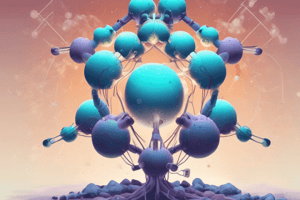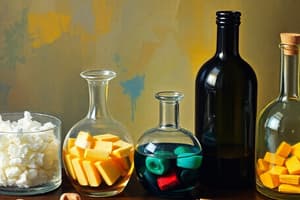Podcast
Questions and Answers
What is the difference between a mixture and a compound?
What is the difference between a mixture and a compound?
A mixture is made of two or more substances that are not chemically combined, whereas a compound is made of two or more elements that are chemically combined.
The composition of a mixture can vary.
The composition of a mixture can vary.
True (A)
The composition of a compound can vary.
The composition of a compound can vary.
False (B)
What is the difference between a compound and an element? Give two examples of each.
What is the difference between a compound and an element? Give two examples of each.
What is the difference between an atom and a molecule?
What is the difference between an atom and a molecule?
What is the difference between a heterogeneous mixture and a homogeneous mixture? Give an example of each.
What is the difference between a heterogeneous mixture and a homogeneous mixture? Give an example of each.
What are three types of homogeneous mixtures? Give an example of each.
What are three types of homogeneous mixtures? Give an example of each.
Describe five physical properties of water.
Describe five physical properties of water.
How is density calculated? What are the units?
How is density calculated? What are the units?
What are the separation techniques of filtration and distillation?
What are the separation techniques of filtration and distillation?
Explain the difference between a chemical change and a physical change.
Explain the difference between a chemical change and a physical change.
What is a molecule?
What is a molecule?
What is a compound?
What is a compound?
What is a pure substance?
What is a pure substance?
What is an element?
What is an element?
What is an atom?
What is an atom?
What is a heterogeneous mixture?
What is a heterogeneous mixture?
What is a homogeneous mixture?
What is a homogeneous mixture?
What is a solution?
What is a solution?
What is a suspension?
What is a suspension?
What is a colloid?
What is a colloid?
What is a physical property?
What is a physical property?
What is viscosity?
What is viscosity?
What is conductivity?
What is conductivity?
What is malleability?
What is malleability?
What is melting point?
What is melting point?
What is boiling point?
What is boiling point?
What is density?
What is density?
What is characteristic property?
What is characteristic property?
What is filtration?
What is filtration?
Study Notes
Mixtures and Compounds
- Mixtures consist of two or more substances that are not chemically combined, allowing variability in composition.
- Compounds are formed from two or more elements chemically combined in fixed ratios, exemplified by water (H₂O).
Composition Variability
- Mixtures can have changing compositions, demonstrated by the varying amounts of sugar in coffee.
- In contrast, compounds maintain a constant composition, as seen in water consistently being H₂O.
Elements vs. Compounds
- Compounds consist of multiple elements joined together; for example, sodium chloride (NaCl).
- Elements are singular substances, like iron (Fe).
Atoms vs. Molecules
- Atoms represent the smallest unit of an element, while molecules are the smallest unit of a compound, composed of atoms.
Types of Mixtures
- Heterogeneous mixtures reveal their different components, such as sand in water.
- Homogeneous mixtures appear uniform, such as milk or Gatorade.
Types of Homogeneous Mixtures
- Solutions: Mixtures where substances are entirely dissolved, e.g., Kool-Aid.
- Suspensions: Mixtures that can settle over time, like clay in water.
- Colloids: Mixtures with particles that remain suspended, such as fog or homogenized milk.
Physical Properties of Water
- Boiling point: 100°C
- Odor: Odorless
- Flammability: Nonflammable
- Density: 1.00 g/cc
- Color: Clear
Density Calculation
- Density formula: D = m/v
- Common units for density: g/cc
Separation Techniques
- Filtration separates based on solubility; one substance is soluble while the other is not.
- Distillation relies on differing boiling points of substances.
Changes in Substances
- Physical changes do not alter the substance's identity, only its form.
- Chemical changes produce new substances with distinct identities and properties.
Key Definitions
- Molecule: Smallest unit of most compounds.
- Compound: Substances formed by chemically combining two or more elements in specific proportions.
- Pure Substance: Consistent composition without variation.
- Element: Basic substance that cannot be reduced further.
- Atom: The smallest unit of an element.
Mixture Classifications
- Heterogeneous Mixture: Components are distinctly different.
- Homogeneous Mixture: Uniform mixture throughout.
- Solution: A type of homogeneous mixture.
- Suspension: Heterogeneous mixture that separates over time.
- Colloid: Heterogeneous mixture with non-settling particles.
Physical Properties
- Physical property: Observable characteristics without altering the substance.
- Viscosity: Resistance of a liquid to flow.
- Conductivity: Material's ability to conduct heat or electricity.
- Malleability: Capability of a substance to be shaped or thinned out.
- Melting Point: Temperature where solid transitions to liquid.
- Boiling Point: Temperature where liquid changes to gas.
- Density: Mass of a substance in a given volume.
- Characteristic Property: Consistent property unique to a substance.
Studying That Suits You
Use AI to generate personalized quizzes and flashcards to suit your learning preferences.
Description
Explore the fundamental differences between mixtures and compounds with these flashcards. Learn how their compositions vary and understand their chemical properties. Perfect for science students looking to solidify their knowledge of basic chemistry concepts.




